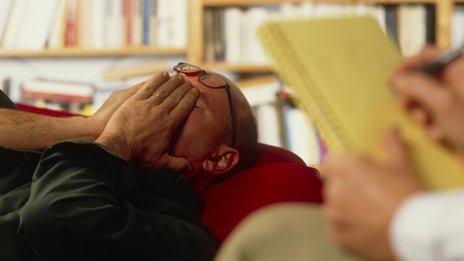Schizophrenia: talking therapy offers 'little benefit'
- Published

Talking therapies are one treatment option for schizophrenia
Talking therapies have "little impact" on the symptoms of people with schizophrenia, a study suggests.
A University of Hertfordshire team analysed over 50 studies , externalon the use of cognitive behavioural therapy (CBT) from around the world.
They found CBT only had a "small therapeutic effect" on schizophrenic symptoms.
However, CBT is one of the treatment options recommended in many countries, including the UK.
The National Institute for Health and Care Excellence (NICE) argues CBT is effective, and recommend it for all people with the disorder.
'Tackles underlying cause'
Schizophrenia is a serious mental health condition affecting around one in 100 people.
Characteristic symptoms include hallucinations and delusions as well as a lack of motivation and becoming withdrawn.
NICE recommends using a combination of talking therapies - including CBT - and antipsychotic medications.
The study, published in the British Journal of Psychiatry, looked at 52 studies carried out over the last 20 years.
It found that CBT did have a small benefit in treating delusions and hallucinations - which is what the therapy was was originally developed to target.
But the researchers said even this small effect disappeared when only studies using 'blind testing' were taken into account - this is where researchers do not know which group of patients are receiving the therapy.
Keith Laws, professor of cognitive neuropsychology at the University of Hertfordshire who led the study, questioned the use of CBT.
He said: "With this evidence, the current government policy which mandates this treatment for all patients with schizophrenia in England and Wales needs to be reconsidered."
But Paul Jenkins, chief executive of the charity Rethink Mental Illness, said: "There's a significant amount of anecdotal evidence from our members who have schizophrenia that talking therapies, like CBT, are an invaluable tool for helping them manage their illness and improve their quality of life.
"We have found that CBT can help people understand and respond better to voices in their head and to hallucinations, tackle the underlying causes of their condition and give them a more optimistic outlook."
- Published31 May 2013
- Published26 September 2013